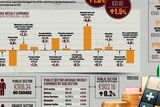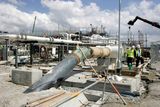Wage growth is back as private sector pay rises for three quarters

It's quite likely that some readers, sitting on a wage packet that's remained static for a number of years now, will curse when reading this.
So don't shoot the messenger.
But according to the Central Statistics Office, gross average wages are on the up compared to the same period last year. And they have been so for some months.
The average weekly wage recorded between April and June was €697.52, meaning the average salary is now around €36,271. That's up 1.8pc year-on-year.
Across the economic sectors, average weekly earnings increased in seven of the 13 sectors, with the largest percentage increase recorded in the administrative and support services sector, while construction saw the biggest annual fall. IT employees remain the best paid, while the worst are those in accommodation and food services.
Business lobby group the Irish Small and Medium Enterprises Association (Isme) was quick out of the traps to point out the discrepancy between public and private average wages. Average public sector weekly pay amounts to €918.24, compared to €631.81 for the public sector. That's not on, suggested Isme chief Mark Fielding, who demanded a public sector pay commission be established.
While pay for both sectors have risen, the private sector is rising more rapidly, with a 2.3pc year-on-year growth compared to 0.2pc for the public sector, when semi-state bodies are excluded.
With the economy now recovering strongly, in fact even surpassing expectations, and unemployment consistently falling, analysts believe wage growth has returned.
Davy Stockbrokers said that the data provides a "welcome" sign for the economy, adding that the aggregate figures have actually been depressed by the small rise in the public sector.
"This is the third consecutive quarter that private sector earnings growth has been in positive territory - suggesting that wage growth is now returning to the Irish economy," said Davy economist Conall Mac Coille.
"This is consistent with evidence from a recent IBEC survey suggesting that 60pc of Irish companies were planning a 2pc median wage increase in 2015."
"Also, PMI (Purchasing Managers' Indices) surveys have started to point to wage growth."
This is also consistent with the strong 5.6pc growth in income tax, and 8.8pc in PRSI receipts, over and above the 3pc annual growth in employment recorded in the year to the second quarter.
"Indeed, a key feature so far in Ireland's recovery has been the lack of reflationary pressures, evident not only in weak CPI inflation but also in on-going falls in the stock of bank lending, and means that rising house prices have stretched affordability," Mr Mac Coille added.
"The return of positive wage growth will help reflationary pressures and bank lending to recover in nominal terms and allow house prices to rise over the medium term without stretching affordability further."
The UK has been enjoying wage rises for some time now. There, in the three months to May, total pay, including bonuses, grew by 3.2pc compared with the previous year.
And ultra-low inflation means in real terms, the growth was the fastest since the summer of 2007.
Higher wages mean a boost for consumer confidence, and in turn, spending. Which is good for the economy.
Join the Irish Independent WhatsApp channel
Stay up to date with all the latest news















